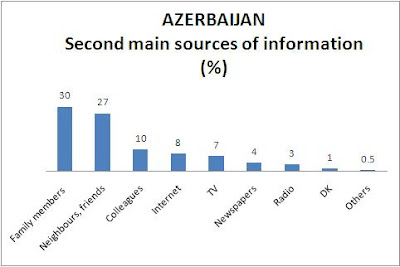Many domestic and international observers consider the territorial
dispute over Nagorno Karabakh to be one of the most significant issues in Azerbaijan.
Gibler and Miller (2012) argue that "states must often settle territorial
issues with their neighbors in order to democratize" ("Quick
Victories? Territory, Democracies and Their Disputes"). The 2011 Caucasus
Barometer (CB) covered several questions in Azerbaijan and Armenia about
Nagorno Karabakh. This blog will cover the results in Azerbaijan and the next
blog will cover the results in Armenia. The results show that the territorial problem
is considered one of the most important issues in Azerbaijan. There is also a
great deal of uncertainty about when the conflict will be resolved, and whether
a solution would be achieved by peaceful negotiations or by force. Additionally,
most of the population in Azerbaijan thinks
Turkey should be involved in the conflict resolution process, and a majority of
Azerbaijanis favor the integration of the area within the national boundaries
of Azerbaijan.
Source: CB
2011, 2010, 2009
About one third (31%) of Azerbaijanis in 2011 consider territorial integrity
to be the most important issue in the country—followed by unemployment (28%). This
is a substantial drop from 2010 when just over half of the population found
territorial integrity to be the most important issue in the country. There is no
notable variation in opinion across age groups, gender or level of education.
For example, men are as concerned about this issue (32%) as women (30%).
In general, uncertainty and pessimism are the most widespread feelings
about finding a solution to the conflict. About 34% of Azerbaijanis have no
idea when the conflict will be resolved. 10% think Azerbaijan and Armenia will
never be able to find a solution. 5% believe the problem will be resolved
within the next year, 24% say in 2-5 years, 12% in 6-10 years and 12% in more
than 10 years. The remaining 3% believe that the conflict has already been
resolved.
Public opinion is also split about whether a potential solution would
most likely be achieved by peaceful negotiations or by force. Just about 51% in
Azerbaijan think a solution will come about by peaceful negotiations and 42% think
a forceful solution would be expected. In addition, survey respondents were
asked to indicate their level of acceptance over separately listed potential
outcomes to the conflict. The majority (90%) favor the integration of Nagorno Karabakh
within the national boundaries of Azerbaijan (without any kind of regional autonomy).
23% definitely favor granting the region some degree of autonomy (28% would accept
autonomy under some circumstances and 40% would never accept it). Other
provided options such as joint governance of the region by Armenia and
Azerbaijan, the establishment of an independent state of Nagorno Karabakh, or making
the territory a formal part of Armenia are not favored by the majority of the
population (84%, 82% and 95%, respectively).
 |
|
Source: CB
2011
|
The 2011 CB also asked Azerbaijanis about which countries or groups they
think should be involved in helping to solve the conflict. The majority of
Azerbaijanis welcome heavier involvement by Turkey (86%). Russia is preferred
as the second option, consistently with the recent development of dialogue promoted by Moscow ("Russia to
continue to push for Nagorny Karabakh Dialogue"). This is followed by
the European Union (40%), United States (35%), and France’s involvement is the least
favored at 15%.
 |
| Source: CB 2011 |
Thus, the survey results show that there is a large interest
in the Nagorno Karabakh issue in Azerbaijan. Many are unsure about when the conflict will be resolved, and
whether a solution would be achieved by peaceful negotiations or by force. Most
of the population favors the integration of the area within the national
boundaries of Azerbaijan and see a large role for Turkey in the conflict
resolution process.
Interested in knowing more about these survey questions
and how they differ with respect to socio-demographic groups in Azerbaijan?
Visit CRRC’s fun and easy Online Data Analysis tool online at http://www.crrc.ge/oda/
















